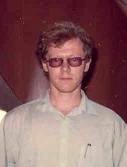PDF
file of Abstract
Part 1. Joint work with Boris E Levitskij.
We generalize Talenti's symmetrization method to new comparison
theorems for a wider class of equations. Let $\Omega \subset \mathbb
R^m$ be an open set with finite volume.
Let $0< q \leqslant p-1$. Let $\Phi(s)=s^{\alpha/(p-1)}$, where
$\alpha< \frac{1}{m}+\frac{p-1-q}{q}$. For each measurable
function $u:\Omega \to \mathbb R$ and each point $x \in \Omega$
we set $$g_0(x,u)=\Phi^{p-1}({\rm meas}\{y \in \Omega: |u(y)|>|u(x)|\})\,.$$
Let $u$ be a positive weak solution of the following equation$$
\quad \quad -\sum\limits_{k=1}^{m}\frac{\partial}{\partial x_k}\bigl(g_0(x,u)|\nabla
u|^{p-2}\frac{\partial u}{\partial x_k}\bigr)=f(x)+k|\nabla u|^q\,,
\quad \quad \quad(1)$$equipped with zero Dirichlet boundary conditions.
Here $f \in L^1(\Omega)$ and $k \geqslant 0$. Let $\Omega^{\star}$
be thespherical symmetrization of the set $\Omega$. In other words$\Omega^{\star}$
is a ball in $\mathbb R^m$ of the same volume as the measure of$\Omega$.
Let $u^{\star}:\Omega^{\star}\to \mathbb R$ and $f^{\star}:\Omega^{\star}\to
\mathbb R$ denote the sphericalsymmetrization of the functions
$u$ and $f$ respectively, and let
$V:\Omega^{\star}\to \mathbb R$ be the maximal weak solution for
$$\quad \quad -\sum\limits_{k=1}^{m}\frac{\partial}{\partial x_k}\bigl(g_0(x,V)|\nabla
V|^{p-2}\frac{\partial V}{\partial x_k}\bigr)=f^{\star}(x)+k|\nabla
V|^q \quad \quad \quad (2)
$$in $\Omega^{\star}$, which is the symmetrized version of equation(1).
Equation (2) is also equipped with zero Dirichlet boundaryconditions.We
prove that $V$ exist and unique and that $u^{\star} \leqslant
V$. Also we prove that $|\nabla u|_{L^p(\Omega)} \leqslant |\nabla
V|_{L^p(\Omega^{\star})}$.Generalizations of this result are also
considered.
\vspace{5mm}
Part 2. Other topics.
The Back2Fields Colloquium Series celebrates the accomplishments
of former postdoctoral fellows of Fields Institute thematic programs.
Over the past two decades, these programs attracted the rising
stars of their field and often launches very distinguished research
careers. As part of the 20th anniversary celebrations, this series
of colloquium talks will allow the general mathematical public
to become familiar with some of their work.
Back to top